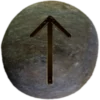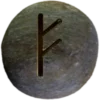Last Updated on February 24, 2025
Table of Contents
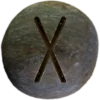
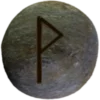
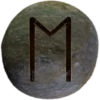
Symbolism and Symbology
The Gebō rune (ᚷ) comes from the Elder Futhark script. It represents the g sound. Scholars pronounce it as “GAY-boh” or “GHEH-boh,” depending on dialect. Some variations include “Gebo” or “Gifu.” The Anglo-Saxon Futhorc later used Gyfu (pronounced “YEE-voo”). Despite spelling differences, all versions share the same meaning—gift, exchange, and generosity.
The shape of Gebō resembles an X. This form symbolizes balance, partnership, and unity. The rune’s core meaning revolves around gifts, but not just physical ones. It represents the act of giving and receiving. Ancient societies saw gift-giving as a way to form bonds. Kings, warriors, and merchants exchanged gifts to secure loyalty, peace, and respect.
The rune also symbolizes divine gifts. In many cultures, people believed gods granted wisdom, strength, or protection. These blessings required a form of return, often through rituals, sacrifices, or devotion. Gebō reminds people that giving and receiving must remain balanced. If one side takes too much, harmony breaks.
In personal relationships, Gebō symbolizes love, trust, and mutual respect. Norse and Germanic societies viewed marriage as a sacred bond. Exchanging gifts played a key role in securing vows. Rings, weapons, or dowries acted as symbols of commitment. The rune represents not only material exchanges but also the intangible—loyalty, support, and emotional connection.
Runic Inscriptions and Magical Use
Ancient inscriptions often included Gebō to invoke blessings or mark important exchanges. People carved it into tools, weapons, and amulets. They believed it brought luck in trade and partnerships. Warriors sometimes marked their weapons with Gebō, hoping for victory through alliances rather than conflict.
In magic, practitioners used Gebō in charms for love, protection, and prosperity. Some believed drawing the rune on a gift strengthened its value. Others used it in spells for binding agreements or sealing oaths. It frequently appeared in combination with other runes to enhance its meaning.
References in Old Texts
The Anglo-Saxon Rune Poem includes a stanza about Gebō under the name Gyfu. It states that gifts bring honor and help build friendships. This aligns with the historical practice of gift-giving in noble and warrior circles. Although the Poetic Edda and Prose Edda do not mention the rune directly, the concept of gift exchange plays a central role in many stories. ![]()
Modern Interpretations and Uses
Many people today use Gebō as a symbol of harmony and gratitude. It appears in jewelry, tattoos, and artwork as a reminder of balanced relationships. Some view it as a sign of generosity, while others see it as a mark of fate—what one gives, one receives.
In divination, Gebō signals an upcoming gift, a new partnership, or an important exchange. It may also serve as a warning against imbalance. If one gives too much without receiving, exhaustion follows. If one takes without gratitude, they may lose what they gained.
The rune’s meaning extends beyond personal relationships. It applies to business, spiritual practice, and even self-care. Giving time and energy wisely ensures growth and stability. Like the ancient practice of gifting, the rune reminds people that true wealth lies in the bonds they form.
Runes Associated with Gebō
Wunjō (pronounced “WOON-yo”) represents joy, harmony, and fulfillment. This rune connects with Gebō through themes of balance and mutual exchange. True joy often comes from shared experiences, much like gifts strengthen relationships. Wunjō also signifies well-being and success in endeavors. The rune appears in blessings and charms, reinforcing the idea that happiness grows through generosity.
Ehwaz (pronounced “EH-wahz”) symbolizes movement, partnership, and trust. This rune represents balance in relationships. Both Elder Futhark runes focus on cooperation and mutual reliance. Trust builds through fair exchanges, just as a strong partnership grows through shared effort. ![]()
Its Power in Asatru
Asatruar honor Gebō as a symbol of balance, generosity, and sacred exchange. This rune represents the bonds formed through gifting. In Asatru, giving and receiving create strong relationships within the kindred and with the gods. Many offer mead, food, or crafted items during blóts to honor the gods and spirits. These gifts strengthen the connection between mortals and the divine.
The Hávamál emphasizes generosity’s importance. Odin states that gifts create goodwill and forge lasting friendships. The concept of Gebō extends beyond material exchanges. It includes wisdom, loyalty, and acts of kindness. Asatruar believe that giving freely brings blessings, while greed leads to misfortune. Many use this rune as a reminder of fair exchange in all aspects of life.
Oaths, Alliances, and Spiritual Balance
Oaths hold deep significance in Asatru. Gebō symbolizes the trust that binds people through promises and mutual respect. Whether in marriage, friendship, or thew (customary law), fair exchanges ensure lasting harmony. Breaking an oath damages one’s honor and disrupts the balance that it represents.
Many Asatruar believe this rune also signifies the gifts given by the gods. Odin sacrificed himself to gain the runes, an exchange of suffering for wisdom. Freyr gave away his sword for love, showing that true gifts demand personal sacrifice. These myths reinforce Gebō’s lesson—nothing comes without an equal return.

